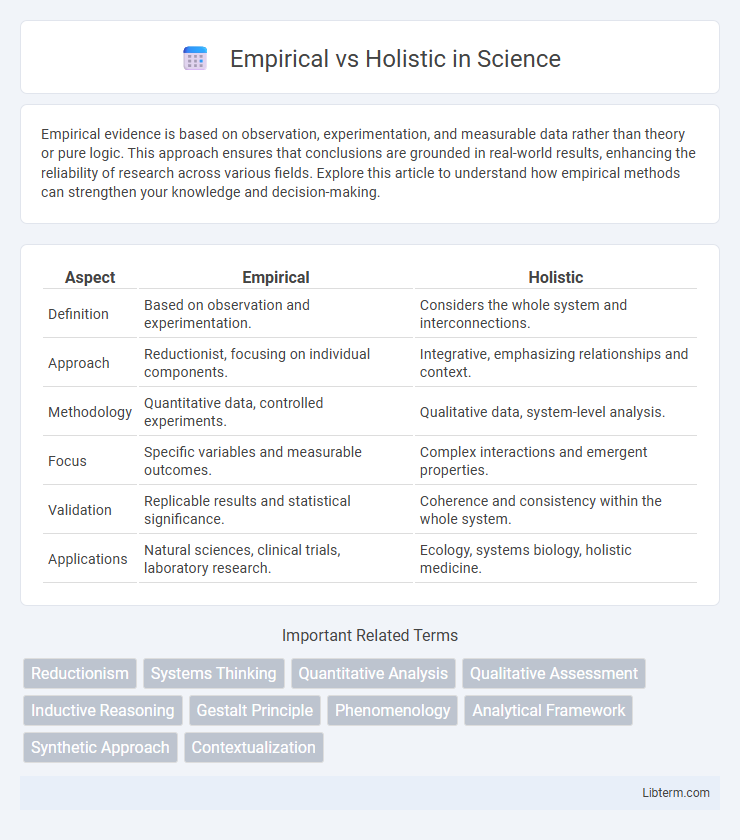Empirical evidence is based on observation, experimentation, and measurable data rather than theory or pure logic. This approach ensures that conclusions are grounded in real-world results, enhancing the reliability of research across various fields. Explore this article to understand how empirical methods can strengthen your knowledge and decision-making.
Table of Comparison
| Aspect | Empirical | Holistic |
|---|---|---|
| Definition | Based on observation and experimentation. | Considers the whole system and interconnections. |
| Approach | Reductionist, focusing on individual components. | Integrative, emphasizing relationships and context. |
| Methodology | Quantitative data, controlled experiments. | Qualitative data, system-level analysis. |
| Focus | Specific variables and measurable outcomes. | Complex interactions and emergent properties. |
| Validation | Replicable results and statistical significance. | Coherence and consistency within the whole system. |
| Applications | Natural sciences, clinical trials, laboratory research. | Ecology, systems biology, holistic medicine. |
Understanding Empirical Approaches
Empirical approaches prioritize observation, measurement, and experimentation to gather concrete data and validate hypotheses. These methods rely heavily on scientific evidence and reproducibility, ensuring that findings are objective and quantifiable. Understanding empirical approaches involves emphasizing data-driven decision-making and systematic analysis in research across disciplines such as psychology, medicine, and social sciences.
Defining Holistic Perspectives
Holistic perspectives emphasize understanding systems by integrating multiple interconnected components, recognizing the complexity and context of the whole rather than isolating individual parts. This approach contrasts with empirical methods that rely heavily on observable, measurable data and often prioritize reductionist analysis. By incorporating qualitative insights, experiential knowledge, and systemic interactions, holistic perspectives provide a more comprehensive framework for addressing multifaceted problems in fields such as healthcare, environmental science, and organizational management.
Key Differences: Empirical vs Holistic
Empirical approaches prioritize observable, measurable evidence and rely heavily on data collection, experimentation, and statistical analysis to draw conclusions. Holistic methods emphasize the integration of multiple perspectives, considering emotional, social, and contextual factors to understand complex systems fully. The key difference lies in empirical's focus on objective, quantifiable information versus holistic's reliance on subjective, interconnected insights for comprehensive understanding.
Historical Development of Both Methods
Empirical methods originated from the scientific revolution, emphasizing observation, experimentation, and data collection to understand phenomena through measurable evidence. Holistic approaches developed later, influenced by indigenous knowledge systems and integrative philosophies, focusing on interconnectedness and the synthesis of multiple perspectives rather than isolated variables. Historical development shows empirical methods dominating early scientific inquiry while holistic frameworks gained prominence in fields like ecology, medicine, and social sciences to address complexity and multidimensionality.
Applications in Scientific Research
Empirical methods in scientific research emphasize observation, measurement, and experimentation to produce quantifiable and reproducible data, essential for hypothesis testing and validation. Holistic approaches integrate multiple disciplines and qualitative insights, addressing complex systems and context-dependent variables often overlooked by purely empirical studies. Combining empirical rigor with holistic perspectives enhances research accuracy and applicability across fields like environmental science, healthcare, and social sciences.
Strengths of Empirical Analysis
Empirical analysis excels in providing data-driven insights by relying on observable and measurable evidence, enhancing the accuracy and reliability of conclusions. It allows for reproducibility and verification through systematic experimentation and statistical testing, ensuring objectivity in research outcomes. This approach is particularly effective in identifying causal relationships and patterns within large datasets, supporting evidence-based decision-making across various scientific and business domains.
Advantages of Holistic Thinking
Holistic thinking enhances problem-solving by integrating multiple perspectives and recognizing patterns that empirical methods may overlook, fostering more creative and adaptive solutions. It allows for a comprehensive understanding of complex systems by considering interdependencies and contextual factors beyond isolated data points. This approach supports sustainable decision-making and innovation by aligning diverse elements into a cohesive framework.
Challenges and Limitations
Empirical methods often face challenges related to data quality, measurement errors, and limited scope, which can restrict the generalizability of findings. Holistic approaches encounter limitations in managing complexity and subjectivity, making it difficult to produce consistent, replicable results. Both paradigms struggle with balancing depth and breadth, impacting the validity and applicability of their conclusions.
Integrating Empirical and Holistic Methods
Integrating empirical and holistic methods combines data-driven analysis with comprehensive, context-aware perspectives to enhance decision-making and problem-solving. Empirical approaches prioritize measurable evidence and statistical validation, while holistic methods emphasize interconnectedness and qualitative insights across systems. This integration fosters robust solutions by leveraging quantitative data alongside experiential and systemic understanding.
Choosing the Right Approach for Your Needs
Empirical approaches rely on data-driven evidence and measurable outcomes, making them ideal for projects requiring precise validation and repeatability. Holistic methods consider the broader context, integrating qualitative insights and system-wide impacts to address complex, multifaceted challenges. Choosing the right approach depends on your specific needs, with empirical suited for analytical tasks and holistic favored for comprehensive understanding and strategic planning.
Empirical Infographic

 libterm.com
libterm.com